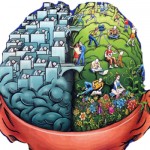Economics is in the midst of a quiet crisis having undergone a schism forty years ago, and showing no signs of healing. In the paper, “Towards a neo-Darwinian synthesis of neoclassical and behavioral economics,” I argue that the natural sciences provide the best route to re-unite economics.
Economics is divided into the neoclassical school that assumes people are rational maximizers and the behavioral school that argues people are, in the words of Richard Thaler, “dumber and nicer” than neoclassical economists assume.
Behavioral economics has become more powerful because it has documented a series of deviations between the behavior of actual living people, and the predicted behavior of Homo economicus.
The schism between the two economic camps is exemplified by the relationship between Professor Thaler and Eugene Fama, his colleague at the University of Chicago. In the NY Times, Fama dismisses Thaler’s work as follows, “What Thaler does is basically a curiosity item … How did some of this [behavioral economic] stuff ever get published?”
Here you have two tenured professors at the University of Chicago, one of the best schools in the world for economics, who disagree about the core assumptions of the field. Economics is in disarray.
The first behavioral papers were published in the 1970s by Daniel Kahneman and Amos Tversky. Roughly half a century later, the neoclassical and behavioral scholars are no closer to each other. In fact, the 2001 NY times article where Eugene Fama dismisses behavioral economics is still a good description of the state of economics. No change in 15 years.
In fact, economics has been stymied for decades. Biology provides a path to heal the schism and move economics forward. The core dispute in economics is reconciling sophisticated, ‘smart’ behavior with silly, ‘dumb’ behavior. Biology has a unified theory that explains both sorts of behavior, and there is no similar schism within biology.
Consider the work of Nobel-prize winner Niko Tinbergen on herring gulls. These birds exhibit all sorts of sophisticated strategies to survive and reproduce in challenging environments. A neoclassical economist could marvel in their ability to fly, forage, and raise offspring.
Tinbergen’s work, however, demonstrated some herring gull behaviors that may appear silly. In the wild, gull chicks beg for food by pecking the bills of adults, which have red patches. Tinbergen discovered that gull chicks have innate tendencies to peck at red dots even on artificially-constructed birds. Furthermore, the chicks prefer pencils with red erasers over realistic, model birds without red.
Get Evonomics in your inbox
If Richard Thaler were studying the herring gulls, one could imagine him writing a behavioral economic paper on the ‘anomalous’ behavior of gulls. These birds are so silly as to try to feed from pencils. Professor Thaler might further conclude that Darwinian theory is false as these herring gulls in artificial settings fail to survive and reproduce.
Biologists, however, have no problem with herring gulls behaving in ways that appear both smart and silly. Natural selection produces elegant solutions such as flying. However, behavior is created by specific neural mechanisms that can produce anomalous behavior in some settings.
Indeed, Tinbergen did not see this pencil-pecking behavior as anomalous, but rather viewed it as being produced by adaptive mechanisms that arose in a herring gull world without pencil erasers.
This biological view provides a way to reconcile behavioral and neoclassical economics. Humans, like other animals, are under evolutionary pressure to maximize. This maximization is nearly identical to the predictions of neoclassical economics. However, the anomalies of behavioral economics are produced when decision-making mechanisms are activated in particular environments.
Economics can learn from biology, heal the schism, and move forward with a cohesive and relevant approach to human behavior.
Read the paper: Burnham, T. (2013). Toward a Neo-Darwinian Synthesis of Neoclassical and Behavioral Economics.
Donating = Changing Economics. And Changing the World.
Evonomics is free, it’s a labor of love, and it's an expense. We spend hundreds of hours and lots of dollars each month creating, curating, and promoting content that drives the next evolution of economics. If you're like us — if you think there’s a key leverage point here for making the world a better place — please consider donating. We’ll use your donation to deliver even more game-changing content, and to spread the word about that content to influential thinkers far and wide.
MONTHLY DONATION
$3 / month
$7 / month
$10 / month
$25 / month
You can also become a one-time patron with a single donation in any amount.
If you liked this article, you'll also like these other Evonomics articles...
BE INVOLVED
We welcome you to take part in the next evolution of economics. Sign up now to be kept in the loop!























